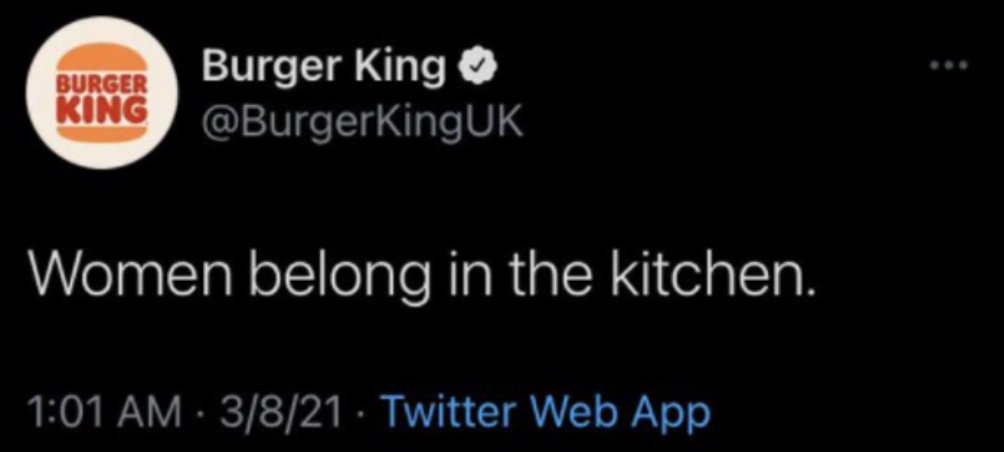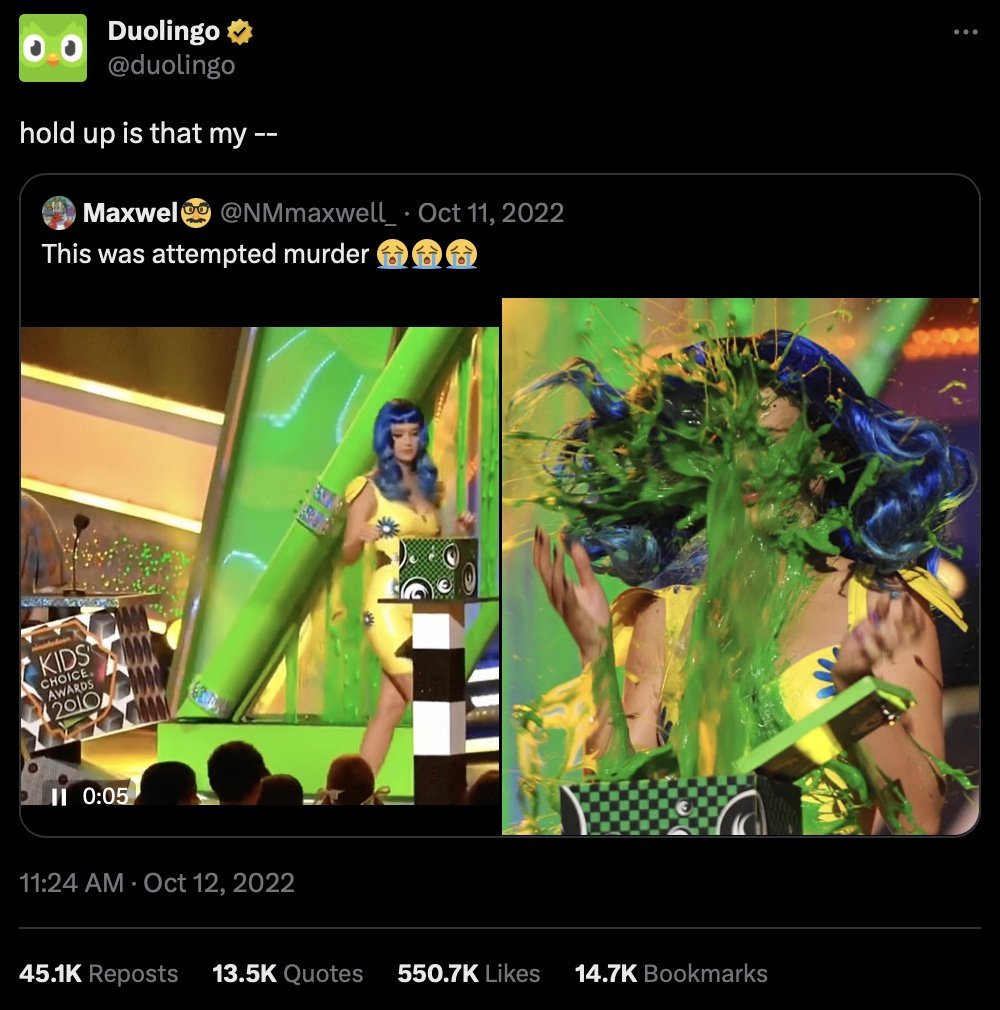Unhinged Social Media Marketing: the Good, the Bad and the Science
There’s been some D-R-A-M-A in the social media marketing world between the beloved green owl of Duolingo and social media marketer, Jack Appleby. To get to the tea, first you need to get with the terminology:
What does it mean to be “unhinged” on social media?
Examples of unhinged marketing:
Snickers talking D-veins after fake news surfaced about the candy bar:
Burger King’s misogyny (deleted):
The rise of unhinged social media marketing
Unhinged social media has emerged in social strategy over the years—but more recently, it’s become controversial. Whether it’s to make a splash in a pool of the same or to appease Gen-Z trends and our ever-shrinking TikTok attention spans, it’s not a new concept. There’s just a name for it now.
Being “unhinged” seems to be the official term for brands with an unexpected and unconventional approach on social platforms. They loudly aim to appear more human and more fun—but make *some* uncomfortable. These brands are abandoning the traditional, polished methods of marketing in favor of a more chaotic and unpredictable style.
As more brands push the envelope, many marketers are debating the quality of work that a social media manager with an “unhinged” strategy might provide.
Because it’s polarizing.
You’re either for it (and find yourself defending it) or profoundly against it.
I am the in-between. Why?
Method to the madness
Psychologically speaking, there’s a method to unhinged marketing’s madness.
The amygdala is the part of your brain that responds to surprise as well as interest and motivation. The brain scans new information for familiarity. If it recognizes the information, it knows how to respond. If the information is new or surprising or unexpected, the brain's synapses light up like fireworks. If the information is boring, they don’t.
When we’re surprised, our brains are forced to make sense of something that we did not expect. This can lead us to question our existing beliefs and behaviors and to consider new possibilities. Your brain's response is prompted by the element of surprise, which triggers a high level of curiosity that feeds the drive to fill the information gap that has suddenly opened up.
According to behavioral economist George Loewenstein, the Information Gap Theory of curiosity is the distance between what we know and what we want to know.
While serving as professor of Economics and Psychology at Carnegie Mellon, Loewenstein conducted many studies to discover the perfect strategy for triggering curiosity. He found that violating one’s expectations and creating a gap of information leads to the stimulation of curiosity until it is satisfied.
However, the key component is knowing when to draw the line.
Loewenstein learned that curiosity has a limited lifespan. It starts out strong and builds up to a peak but if left unsatisfied, it dissipates. If they get bored, you lose ‘em. If you cross a line and they get offended, you lose ‘em.
When we are surprised, it drives a chemical need in our brain to find out WHY we just saw what we saw and figure out WTF is going on. And because it was so unexpected, it’s more likely to stand out in our memory. When we can’t justify a reason or disagree with the reason behind whatever shocked us—when a line is crossed—that information gap is either left unsatisfied and/or the emotional damage reputational damage is done.
“The violation of expectations often triggers a search for an explanation and curiosity is frequently a major factor motivating the search.” (Loewenstein, page 91)
Because unhinged marketing relies on the surprising and unexpected, does that mean brands and social media managers adopting this strategy are on to something?
In support of unhinged marketing
Unhinged marketing:
Generates organic & authentic reach
Is relatively inexpensive
Is relatable and personable
In Hubspot’s opinion: "Unhinged marketing can be particularly effective at winning over Gen Z customers who prefer marketing that feels more real and less salesy. What may have been deemed unprofessional in the past is now considered more authentic and relatable."
When people see something unexpected or shocking, it’s more likely to capture their attention. This can lead to higher levels of engagement, such as likes, shares, and comments. Un-commonalities tend to make memories stick out. That’s psychology.
Even this:
And when it works, it WORKS. Recently, Liquid Death leveraged a great (and gross) opportunity when they clapped back at an internet troll’s hate comment that they’d rather “lick sweat off a fat guy’s back than drink Liquid Death.”
It’s so gross, it’s like a car crash. You can’t look away. And it’s hilarious.
Liquid Death’s response is in unison with their branding, but it was still unexpected.
And their strategy of incorporating a “watered-down Jackass” style of entertainment marketing has only increased sales.
Anti-unhinged marketing
“It appears that, up to a certain point, threat and puzzle have positive motivating value, beyond that point, negative value.” (Loewenstein, 84)
Here are some of the risks of unhinged marketing:
It breaks traditional marketing rules
The line between appropriate and relatable/offensive and controversial is thin
Alienating your audience and damaging your reputation is a real possibility if you cross the line and go too far
“You’re going to piss some people off.” (Zaria Parvez, Duolingo)
Or you could lose your job… like Corey Smale did when he posted this viral tweet on behalf of Pabst Blue Ribbon last year:
Who was really to blame for this?
PBR deleted the tweet, publicly apologized and fired the guy, but took no accountability otherwise. Smale was basically a scapegoat wrongfully labeled as a “rogue employee”. That’s like being mad at a kid, but not putting any blame on the parents for raising them. Although this was NSFW, it wasn’t an HR violation?
Agree or disagree, Lead Balloon Podcast, Episode 30 has the most insightful discussion on the situation, if you’re interested in perspectives. Annie-Mai Hodge, Founder of Girl Power Marketing, had more examples, valid points and some key insights of her own to offer. And one painstakingly great point resonated with many from Jack Appleby’s own blog on the matter:
“I really do think too many social media professionals love social media more than the brands they work for.” (Jack Appleby, Future Social)
I wholeheartedly agree. But he’s clearly of the mindset that unhinged marketing should never be a considered option on any brand’s radar, at any time, for any reason.
And on that, I disagree.
No, unhinged marketing doesn’t translate well into every niche.
My focus is primarily in B2B SaaS and you wouldn’t expect or encourage being unhinged there, would you?
Wrong. Here’s an example of the most *unhinged* post, I made for a client:
This meme caused an internal stir for the client. Half of their team applauded and the other half was taken aback, but the CMO LOVED IT. And it’s safe to say, this is tame compared to eating ass.
Is unhinged marketing right for your brand?
Social media has replaced most *if not all* forms of media entertainment. People don’t want to be sold to. They want to be entertained. If you succeed at doing that, they’ll turn around and buy from you.
So, is unhinged social media marketing right for your brand?
It depends on your goals and your target audience.
I don’t know you, so I can’t say whether unhinged marketing is right or wrong for your brand. I will say: don’t dismiss it but, don’t cross the line. While you can’t make everyone happy, you don’t want to be offensive or off-brand (HR, wya?). If you have autonomy in your position and you’re drafting a post that might question the line between offensive and controversial, consult your supervisor and team.
But let’s be clear: being unhinged does not *necessarily* mean being vulgar and overall, it’s not a method that works for everyone, so I don’t think it deserves ALL of the aggression and bad connotation it can sometimes receive.
Some brands want to push the envelope and embrace it. Some brands want to push the envelope and then cower when they get a few negative comments on a post that pushes the envelope just like they thought they wanted. Be careful what you wish for.
When calculated with consensus, unhinged marketing tickles the same brain receptors that fire when you’re surprised and motivated to learn the why behind your triggered curiosity. Standing out quite literally *stands out* in your memory.
People like being comfortable. When you’re loud and bold, you can be seen as abrasive, rude and even, unintelligent. But the truth is, unhinged marketing is usually a calculated risk.
If you want to try your hand at unconventional marketing, you don't have to get completely unhinged. You can loosen a single screw and see how it goes. Do your research, seek support and feedback, and make sure that you are prepared for whatever risks involved.
Unfortunately for the “anti-unhinged,” the traditional rules of marketing have already been broken. Unhinged marketing expands on that and regardless of whether or not you agree – there’s no OFF button for the psychology behind why it works.
Alexis is the social media manager for Edify Content, a B2B SaaS content marketing agency. She graduated from the Florida State University in 2015 with a degree in Psychology and additional academic focus in Hospitality. She continues to use both disciplines daily tied with a little bit of good-natured banter and personal experience to influence her marketing efforts from a unique perspective. For more insights into the psychology of social media, connect with Alexis on Twitter and LinkedIn. 


















